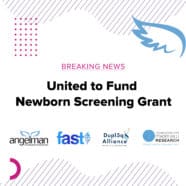
Newborn Screening Grant for Early Check
In 2018, the ASF co-funded a feasibility study to test a newborn screening for Angelman syndrome, Prader-Willi syndrome and dup15q syndrome. As always, we thank our generous donors! Your support and belief in the ASF mission makes it possible to fund ideas that become reality.
ASF, Dup15q, FAST and FPWR Unite to Fund Newborn Screening Grant
Four foundations collaborate to add Angelman syndrome, Prader-Willi syndrome and Dup15q syndrome to the Early Check Newborn Screening Panel
Aurora, Ill. (Nov. 2, 2021) — The Angelman Syndrome Foundation (ASF), Foundation for Angelman Syndrome Therapeutics (FAST), Dup15q Alliance and Foundation for Prader-Willi Research (FPWR) announce a collaborative initiative to fund the addition of chromosome 15 conditions to Early Check, a flexible framework amenable to screening for a variety of conditions. Led by RTI International, Early Check will support the infrastructure necessary to add Angelman syndrome, Prader-Willi syndrome, and Dup15q syndrome to the Newborn Screening Panel.
Angelman syndrome, Prader-Willi syndrome and Dup15q are collectively recognized as chromosome 15 (C15) conditions. Each condition results in inappropriate DNA methylation patterns, which causes the disruption of imprinted gene regulation. The three conditions can have very different symptoms, however they each share chromosomal origins and diagnostic options. Angelman syndrome, Prader-Willi syndrome and Dup15q are targets for emerging therapeutics, including promising disease-modifying strategies, that can potentially benefit greatly from early diagnosis. Newborn screening (NBS) provides the only population-based strategy to identify newborns who could benefit from early disease detection and treatment, as well as more accurately understand the prevalence of each disorder in a prospective manner.
Early Check was developed to create the necessary infrastructure for rare diseases to be included in the Newborn Screening Panel. The results from Early Check studies provide evidence for true disease prevalence, patterns of symptom onset, natural history and clinical outcomes, all of which are necessary to accelerate development of new outcomes, including the implementation of screening for new conditions.
“Newborn screening is an important public health program that helps identify infants with conditions before symptoms emerge, allowing for earlier treatment and eliminating the often stressful diagnostic odyssey for families,” said Anne Wheeler, Ph.D., research public health analyst for RTI International. “The Early Check program in North Carolina was designed to help rare conditions, like Angelman, Prader-Willi and Dup15q syndromes, build the evidence needed to make a case for adding newborn screening to state panels. This project will provide the funding to build an infrastructure to add chromosome 15 conditions to the Early Check panel and develop evidence of benefit for newborns with these conditions and their families.”
Led by RTI International, Early Check was established as a joint collaboration among researchers, public health professionals and clinicians at RTI International, the University of North Carolina at Chapel Hill, Duke University, Wake Forest School of Medicine and the NC State Laboratory of Public Health. For more information on Early Check, please visit earlycheck.org.





